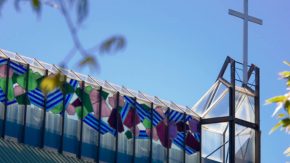News from Alumni, Archives and Foundation
Farewell to a great Newingtonian
Major-General C M I ‘Sandy’ Pearson, AO DSO OBE MC (ON ’36), passed away on 7 November 2012. Sandy was a great Newingtonian and a highly distinguished Australian soldier. As part of his long military career, he served as the commander of the Australian Task Force in Vietnam and as Commandant of the Royal Military College, Duntroon. In later life he was an active supporter of veterans’ and other causes. A friend of the College throughout his life, he served, among other roles, for a decade as a member of the College Council.
Sandy’s life was celebrated with a full military funeral and Service of Thanksgiving in the College Chapel on 15 November. The Chapel was filled to capacity by Sandy’s family and his many friends.
Led by former Newington and Army Reserve Chaplain, Rev Dr Peter Swain, OAM RFD, the service featured hymns and readings from Scripture that Sandy had chosen. A video presentation of memories highlighted Sandy’s character, humility and sense of humour. An account of his schooldays by Dr David Mulford was followed by a eulogy by General David Hurley, AC DSC, Chief of the Defence Force. Sandy’s grandsons, Daniel Weeitch (ON ’96) and Tom Oxley (a Captain in the Army Reserve), presented moving readings. His daughters, Elizabeth Weeitch and Sandra Oxley, spoke about Sandy as a loving father and grandfather.
At the end of the service, Army pall bearers carried Sandy’s coffin through an honour guard of members of Newington’s 1st XV and 1st VIII—Sandy had been a member of both—and past Cadets with the College colours and flag. A solemn military ceremony saw the coffin placed on a gun carriage and move down the Memorial Drive with music from an Army band and an escort of sixty soldiers. Students from Years 8 and 11 lined the Drive as a final farewell from Sandy’s old school. The official party, family and friends then proceeded to the Northern Suburbs Crematorium for a Committal Service.
The passing of a Newingtonian is inevitably a cause of sadness. Here, however, was also an opportunity to celebrate and give thanks for the life of a man loved and respected in all spheres of his remarkable life and career.
ONU Sesquicentenary Dinner 2013
A reminder to all Old Boys and current fathers that the ONU Sesquicentenary Dinner is on Saturday 25 May 2013. Click here to download the Event Flyer.
We’re also calling on Old Boys and current fathers to become Table Captains. Please email Lea Greifeneder if you would like to be a Table Captain or call 02 9568 9540.
From the Archives
A hundred and fifty years ago, on 29 November 1862, the Bathurst Free Press and Mining Journal carried this notice:
Rev William Kelynack’s visit to Bathurst appears to have been part of a campaign by the Educational Committee of the Wesleyan Methodist Church to drum up support—and to raise crucial funds—for the planned school that was to become Newington College. Later to serve as Newington’s President, Kelynack’s first Australian Circuit had been in Bathurst. The Bathurst Free Press looked forward to his return, reporting that ‘…his eloquence is of the first order, being fervid, classical and free.’
The newspaper duly reported on the meetings, quoting from Kelynack’s speech on the Monday evening at length. He reminded his audience that ‘…they should give every encouragement to the best means for the promotion of knowledge. As Wesleyans they ought to take the lead.’ A collection at the end of the meeting raised £50.
While this PR campaign was under way, the Educational Committee addressed two key practical issues that had to be resolved before the new school could be a reality.
Having settled on Newington House at Silverwater as the site for the school, the place had to be put into good order. The architect Thomas Rowe, who later designed the Founders Wing at Stanmore, was asked by the Committee to examine Newington House and report on the cost of necessary repairs.
The Committee addressed the issue of teaching staff in December 1862 by writing to two prominent Wesleyan churchmen then visiting England, asking them ‘…to secure the services of two competent Masters, and send them out with the least possible delay.’
David Roberts
College Archivist







